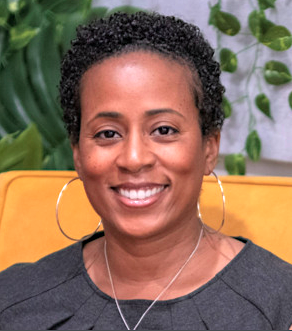Presented by Shawan Worsley, LMFT, LPCC
2 CEUs for LMFTs, LPCCs, LEPs and LCSWs
Watch an interview with Shawan Worsley
This event will not be recorded to allow for honest discussions.
Talking about race, racism and other issues related to cultural identities often causes people to feel anxious. This intermediate-level workshop identifies how “race talk” can be triggering and helps participants consider their capacities for these conversations. Participants explore their own race stories and explore how it feels to communicate these narratives. This workshop teaches participants how to better “read race” during any interpersonal interaction, address racial issues at the moment, and manage intense emotional feelings that arise during these moments. Participants learn mindful strategies for decreasing strong personal reactions, including empathy, self-compassion, mindful listening, and mindful meditative exercises. Importantly, this workshop also provides tools for keeping racial discussions safe and gracious, yet effective ways to engage an individual who says something that is racially offensive.
In this workshop, participants identify the defining characteristics of race talk, including the factors that make them challenging and the consequences of avoidance of discussions of race. Participants analyze two mindfulness strategies, designed to help manage strong emotions raised by race talk, thereby increasing their capacity for participating in these conversations. Clinicians are provided with opportunities to practice these strategies by working through a Race Talk Vignette. Considering the harmful impacts of racism and microaggressions that can occur during race talk, this workshop identifies an antiracist approach to discussions of race. Utilizing examples from the Interpersonal Relationship Allyship Scale and Cultural Cognitions and Action Scale, participants consider antiracist responses when participating in race talk in their professional work. This workshop concludes with 4 strategies for keeping racial discussions safe for participants.
Program Goals
General educational goals reference overall professional growth, improved sophistication, or greater clinical skills, which would occur later (after the workshop) in future clinical work for licensed MFT's, LCSW's, LPCC's or LEP's.
Explore strategies for effectively engaging in discussion related to race and race as part of a racial and ethnoculturally responsive clinical practice.
Learning Objectives
- Identify 3 defining characteristics of race talk
- Practice 2 mindfulness techniques to manage intense emotions triggered by discussions about race
- Identify 4 strategies for keeping racial dialogues safe
About the Presenter
 Shawan Worsley (she/her) is the Founder and Executive Director at Culture Ally. Dr. Worsley is a Licensed Marriage and Family Therapist and a Licensed Professional Clinical Counselor. She holds a Ph.D. in American Studies, an M.A. in Counseling Psychology, and B.As. in African American Studies and International Relations. In her former role as an Assistant Professor, she taught college courses, conducted scholarly research, presented her work at conferences throughout the country, and published an academic book with Routledge Press. As a therapist, Dr. Worsley has worked extensively in communities of color, providing therapy and case management to adults and children in virtually every clinical setting. In addition, she has created and delivered culturally responsive clinical training and consultation to therapists throughout the country. Dr. Worsley’s vocational goal is to help eradicate mental health disparities that impair the health and well-being of communities of color as she continues to provide therapy services through her private practice in Northern California.
Shawan Worsley (she/her) is the Founder and Executive Director at Culture Ally. Dr. Worsley is a Licensed Marriage and Family Therapist and a Licensed Professional Clinical Counselor. She holds a Ph.D. in American Studies, an M.A. in Counseling Psychology, and B.As. in African American Studies and International Relations. In her former role as an Assistant Professor, she taught college courses, conducted scholarly research, presented her work at conferences throughout the country, and published an academic book with Routledge Press. As a therapist, Dr. Worsley has worked extensively in communities of color, providing therapy and case management to adults and children in virtually every clinical setting. In addition, she has created and delivered culturally responsive clinical training and consultation to therapists throughout the country. Dr. Worsley’s vocational goal is to help eradicate mental health disparities that impair the health and well-being of communities of color as she continues to provide therapy services through her private practice in Northern California.
TARGET AUDIENCE: LCSW, LMFT, LPCC, LEP
If you miss any of the presentation, you will not be eligible for the CEUs. SCV-CAMFT is a CAMFT-approved Continuing Education Provider (CEPA 052466). This course meets the qualifications of 2 continuing education credit for LMFTs, LPCCs, LEPs and/or LCSWs.
The views expressed in presentations made at SCV-CAMFT membership meetings or other SCV-CAMFT events are those of the speaker and not, necessarily, of SCV-CAMFT. Presentations at SCV-CAMFT events do not constitute an endorsement of the vendor or speaker's views, products or services.
